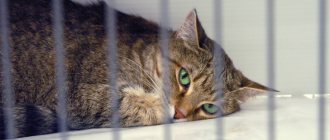Losing a pet is a big loss, and every owner would like to protect himself from it. But it may also be that the death of a beloved cat is associated with not quite ordinary, earthly reasons. It is important to know what this unpleasant event could mean, because cats have long been considered conductors between the world of the living and the dead. Many different cultures revere or even worship these animals. That is why they always paid attention to their death and saw hidden meanings in it.
Stages of death
Death is not an instant, but a process that gradually turns off the body, passing it through the following stages:
- Preagonia - loss of consciousness, cessation of blood circulation, pallor and cyanosis of the skin. This stage can last from several minutes to an hour.
- Terminal pause (preagonia). Breathing practically stops, pressure drops to zero. The oculomotor reflex disappears.
- Agony. Characterized by a lack of consciousness and tactile sensitivity. Breathing may resume and blood pressure may rise. Convulsions may occur.
- Clinical death. Complete stop of all vital processes. When carrying out resuscitation measures, it is possible to “start up” the cat’s body. The duration of the period is about 8 minutes.
- Biological death. This stage is irreversible and is characterized by the complete cessation of all physiological processes in the cat.
How to cope with the death of a cat?
The next step is to preserve the memory of the animal, but at the same time not torment yourself and your loved ones. Some owners erect real monuments to their pets, but whether this is worth doing is up to you to decide, and in any case, the issue of the monument can be discussed later. In the meantime, there are several things in front of you that must be done, no matter how painful it may be! Try:
immediately remove all your pet’s things - bowls, trays, toys: this may seem cruel to you, but this is important first of all for you, because your pet’s things left without him will greatly torment you; remember bright moments from the life of an animal - yes, your cat died, but this is not a reason to constantly replay tragic moments in your head, it’s better to remember how you played with her and how funny she was: after such memories you will definitely smile, and you will think that your pet is still nearby; change habits associated with a cat: for example, if you loved to sit in the chair in which your pet always came to you, then try to sit in another for some time after his death - it will be less painful, because at least you will not be sad remember how the animal jumped onto your lap and subconsciously wait for its appearance.
Another “recipe” that many people recommend is to immediately get a second pet so that you have someone to take care of. This method can be very effective and efficient, but, alas, not for everyone. There are people for whom a deceased cat remains their only and unforgettable friend after death, and for them a new pet in the house is even “contraindicated”, because they may even hate it.
But if you clearly understand that life goes on, and you want to quickly start living without grief and melancholy, a small kitten will be a kind of salvation. Just don’t associate it with your previous pet! Some people think that the soul of a cat moves into another animal after death, but one should not blindly believe in this. Treat the kitten as an independent and completely different animal, and then it will be easier for you to love it without replacing the dead animal with a new one.
Causes of cat death
To understand what the death of a cat means, you must first accurately establish the cause of its death. This can be either natural decline from old age, or poisoning, an accident or an unexpected illness. Sometimes animals jump out of a window or from a balcony for unknown reasons.
It may also be that the cat was killed by one of the neighbors or other people with the goal of causing harm to its owner and causing pain. But fate will certainly punish the offender and he will be haunted by failure for a long time. Ancient superstitions claim that such troubles will last for at least seven years.
The same thing awaits those who want to get rid of newborn kittens and drown them or throw them out into the street, leaving no chance to survive, while having the opportunity to place the babies in good hands.
Natural death from old age rarely contains a hidden meaning. A cat is a mortal creature, the same as all other animals and people on the planet, so it cannot live forever. But the euthanasia of a pet is perceived negatively by higher powers - they punish such owners with constant life failures in all areas of life for two years.
Why do cats leave home to die?
If a cat has this opportunity, it will definitely leave the house before it dies.
For as many years as cats have lived next to people, for the same number of years the question has been asked: why do cats leave home? There are many theories about this. Despite its popularity among people, the cat remains one of the most amazing and mysterious animals. Some believe that the cat wants to remain in the owner’s memories as a beautiful and gentle pet. After all, often before leaving the house forever, a cat goes into a person’s arms to say goodbye. The owner may not even suspect that such a surge of tenderness is the last. There is also a theory that cats leave, taking with them the illnesses and misfortunes of a loved one.
People who are more skeptical believe that a dying animal is not thinking about anything like that. On the contrary, from their point of view, the cat does not understand that the end is near. Therefore, they perceive the painful state as some kind of illness that should pass. To prevent humans from interfering with the animal’s healing, the cat leaves the house for a while. However, there is no strength left to return after a walk, so the pet quietly dies alone with itself.
How do cats behave in an apartment when they can’t leave?
A dying cat will try to leave the house as long as it has the strength to do so.
If the cat could not leave the apartment, it will hide. If we consider the theories about this phenomenon in more detail, it becomes clear that in any case the cat wants to be away from the person in the last minutes. An animal may experience pain, and a person may be regarded by it as the source of this suffering. And some believe that the cat is hiding “out of spite” or because it is proud. In any case, a weakened pet will look for a secluded place. The cat will hide in the closet, under the bed or other dark corner.
However, there are exceptions to this pattern. Only the cat who has the time to do so can afford the luxury of choosing the last place. Animals that die from an accident do not have this opportunity. However, pets who do not want to die and are not ready to say goodbye to life will try to come home to a person. So a cat hit by a car will crawl towards the house until the last moment.
How to care for your pet?
Caring for a dying cat requires effort, time and patience. She needs to be provided with a comfortable and soft place to rest. A cozy and warm lounger can be made from a blanket. Two rules must be followed:
- Regularly monitor the cleanliness of the sleeping area by washing the bedding daily.
- If an old cat cannot control urination, then lay disposable diapers over a soft base, changing them as they get dirty.
When an animal does not have enough strength to go to the toilet, you need help. To do this, he is carried by hand to the tray every 3–4 hours.
You should not violate the cat’s privacy if he tends to distance himself and does not respond to affection.
It is important to relieve your pet's pain symptoms. Cats rarely scream, meow, or otherwise show their distress. But they can be recognized if the following signs are present:
- decreased sociability and detachment;
- immobilization;
- looking at one point;
- dilated pupils;
- refusal to drink and eat;
- intermittent breathing.
Love for the owner
Some people believe that a cat that has left home to die is concerned about its owner's feelings.
There are cases when pets even said goodbye to a faithful friend, meowed, jumped onto his lap for the last time and allowed themselves to be petted.
But it happens that a cat leaves to die suddenly. Yes, perhaps some pets are so attached to home and loved ones that they try to reduce the pain of separation. But this version is unlikely for two reasons:
- firstly, the cat is unlikely to care about approaching death, because it simply does not understand that it is dying. Most likely, the animal is worried about pain, weakness, but clearly not awareness of death or fear of it;
- secondly, such high feelings are unfamiliar to the pet, since he is at a lower stage of evolution and is guided by instinct, not reason. And even more so, a feeling of caring for a person is unlikely to appear in dying cats. It is the primitive instinct that guides reproduction, caring for offspring, and not love, as it happens in people. It is unlikely that a cat, dying, thinks about how its owner feels.
shutterstock
If the body of an animal is found outside the home
If the pet's corpse is found outside the house, the signs are more favorable. Whether the deceased was the pet of the one who discovered it, or is it someone else’s pet, according to signs, such a find promises:
- quick financial receipts;
- successful trip;
- meeting your betrothed if the animal was white;
- a collision with an enemy if the corpse had black fur.
This favor of fate is explained by the fact that the owner is not involved in the death of the pet, and when dying, the furry protector takes all the troubles with him.
Maybe that’s why it is believed that cats leave the house before they die, so as not to cause moral suffering to the owner and not bring trouble to his family.
“Taking away” all the negativity
This sign is polar to the previous one. The death of a beloved pet within the walls of the home saves the life of the owners. Dying within the walls of the apartment, he “takes away” all your negativity, the induced evil eye and damage, thereby freeing his owners from trials, illnesses and other ailments.
If fishermen are afraid of dead cats, then a living cat is a good luck charm for them. Especially with a three-color color, such a pet will bring a good catch, and will also protect you from misfortune.
By the way, back in Ancient Egypt, where, as is known, cats were sacred animals, it was believed that after death a cat becomes a guardian angel. She gives her gift of protection to her beloved owners. The spirit of a deceased pet helps, guides you to the true path and protects you from negative emotions. It is not for nothing that the Egyptians considered the cat to be the link between God and man.
How to avoid this?
Well, you need to know that the only way to avoid sudden death in cats is to make sure they are okay. They need to be fed a high quality diet (no grains or by-products) and it is also very important that they receive anti-parasitic treatment so that they are protected from parasites, both external and internal.
Additionally, we must take them to the vet whenever we suspect something is wrong with them, as well as vaccinate and neuter them before they become eager.
What to do when your cat goes on a spree
If the owner does not set out to increase the number of pets in the apartment, he needs to take measures to alleviate the suffering of his pet and ensure peace for himself. Here's what you can do:
- Sterilize the animal (some veterinarians recommend “putting out” a cat that has already given birth at least once, others believe that this operation will be more useful for nulliparous individuals, in any case, it’s up to you to decide).
- Use drugs of the “anti-sex” class (there are drugs based on natural herbs - they are safer, but weaker in action, and stronger hormonal drugs, the main thing is not to save, otherwise you can pay for the health of your pet).
- Opponents of drastic measures can give animals sedatives in the form of drops for ingestion, or spraying (scattering), for example, catnip in their habitats.
In any case, when choosing methods of influencing the sexual activity of cats, be guided by the health of the animal, its age and your capabilities.
Any owner who decides to have a pet sooner or later begins to ask questions about how long a British cat’s estrus usually lasts, when it begins, and how it goes in general. It is better to know the answers to all these questions in advance.
Diagnostic features
The diagnosis is made, as always, only comprehensively. To do this, anamnesis is taken into account (whether there were any problems with the kidneys before, whether the animal has diabetes mellitus or other health problems), clinical signs and laboratory test results. It is imperative to examine the sediment and the urine itself (general analysis and biochemistry).
A condition in which there are disturbances in the functioning of the excretory system is rarely determined by external signs - the symptoms can suggest or suspect the disease. This is also explained by the fact that the symptoms are “masked” as other diseases, which are excluded only with the help of additional research methods.
An accurate diagnosis of renal failure is made only based on the results of a comprehensive examination with the obligatory implementation of:
- examination and collection of a detailed medical history (medical history and lifestyle);
- laboratory tests of urine and blood;
- Ultrasound of the kidneys and abdominal organs;
- fluoroscopy of the kidneys.
When analyzing urine it is noted:
- increased protein levels (proteinuria);
- the presence of leukocytes and erythrocytes;
- presence of sediment;
- decrease in its density (isosthenuria);
- pH shift to the acidic side.
Blood chemistry:
- increased urea;
- increase in creatinine level;
- fluctuations in the amount of protein in either direction;
- decreased potassium levels;
- increase in the level of calcium, magnesium and phosphorus (with chronic renal failure);
- increased sodium levels.
General blood analysis:
- decrease in hematocrit values;
- decreased hemoglobin levels;
- increase in the number of leukocytes;
- drop in platelet and lymphocyte levels.
Differentiation of acute renal failure and chronic renal failure:
- in case of acute renal failure, anemia does not have time to develop due to the transience of movement, in case of chronic renal failure it is clearly expressed;
- CRF begins smoothly and lasts a long time; at the time of diagnosis, the prognosis is most often unfavorable; AKI manifests suddenly with a lightning-fast course, the prognosis is favorable with timely diagnosis and proper treatment;
- when palpating the kidneys in chronic renal failure, they are almost always painless, while in acute renal failure the pain syndrome is clearly expressed;
- in case of acute renal failure the clinic is bright, in case of chronic renal failure it is not or is very blurred.
Where does the soul of an animal go after death?
In order to figure out where the soul of an animal goes after death, it’s worth figuring out whether it exists at all? What do people know about this and how can they answer this question?
The soul of an animal after death probably finds some kind of refuge. In fact, everything is not as simple as it might seem at first glance. This question is worth turning to the Bible. This holy book, unfortunately, is not able to give a clear answer. After all, little is said about animals, and in general, do they have such a “privilege”. But the conclusion is quite simple, you just need to rely on the basic biblical principles.
Thus, as the Bible says, animals are capable of having a living soul. To do this, it’s worth understanding what the difference is between four-legged friends and humans? Is it possible to draw a line that intersects in one place? Where does the soul of animals go after death? As everyone knows, man was created in the image and likeness of God himself. It was this “being” that was endowed with the ability to think and develop spiritually. Animals cannot do this; they are not capable of doing everything that is given to man. Therefore, if they have a soul, then most likely it is somewhat different. After all, as mentioned above, animals cannot do even half of what is given to ordinary people. But, nevertheless, they are able to feel, love, get angry and experience other emotions.
Is there one place where all the lonely souls gather? How do they do this if they do not have a so-called soul? Quite a lot can be said on this topic. The soul of a cat probably “goes” somewhere after death? And if we reason gradually, then several times we can confirm the presence of a soul and its absence. It’s another matter if in animals it is something slightly different. It is likely that the whole difference lies in the fact that after death the soul of a four-legged friend does not go anywhere. More precisely, he cannot continue to live, thus going to heaven and “serving out” his existence there.
It is quite difficult to understand this aspect. After all, there is not a single scripture that talks about the soul of an animal. No, of course, something similar can be found, but again, everything is so vague and not clearly described that it is impossible to draw an exact conclusion. Therefore, all that remains is to speculate on this topic. So, if an animal does have a soul, then where does it go after death? Can four-legged friends go to heaven? Is “access” open to them there? Is the soul of a dog able to go to heaven after death? This issue should also be approached from different points of view. It should be noted that God created animals and included this process among his creations. He simply gave them life and said that it was good. He didn't give many animals special abilities. Most likely they were created only to dilute the human race. After all, people on their own will not be able to survive in this world if something does not help them. Of course, the entire population of the Earth consists of different “individuals,” but it is thanks to animals that many of them are like that. It is quite difficult to understand this issue; there must be spiritual penetration here.
So will animals go to heaven with humans? Is there room for them there? There is simply no clear answer to this question. The souls of animals must find a home after death. But we can definitely say that it is four-legged animals that will accompany a person at all his “stages” of life. There are quite a few versions about where the soul of an animal ends up. One of them says that somewhere on the edges of the sky there is a place where the souls of deceased four-legged friends gather. It is difficult to say where this information came from.
It is likely that this is just someone's guess. But it is so pleasant that you just want to believe in it with all your heart. Surely animals gain “peace of mind” after death.
Diseases from which a cat can die
Very often, cat owners do not pay attention to minor manifestations of a particular disease, thereby endangering the life of their pet.
Ear mites - settling in a cat’s ears, these “creatures” gnaw through the skin of the animal’s ear canal, which inevitably leads to inflammation, not to mention pain. At the same time, the cat shakes its head and rubs its ears with its paws. This disease will not go away on its own; it must be treated with medication. Moreover, considering the fact that ticks are capable of transmitting fatal diseases and infections. Urological syndrome - manifests itself when the cat is sick with urolithiasis. According to statistics, this is the most common cause of death in animals, even at a young age. And in this case, you cannot hesitate, as you could waste precious time and save the animal. If a cat doesn’t go to the toilet well, “in a small way” - pushes, meows, doesn’t do much or doesn’t do anything at all, then we can say with confidence that the countdown has begun, literally for a day. Rabies is a fatal disease for cats that can be easily avoided if up to date with vaccination.
And at the same time, it doesn’t matter whether the cat goes outside or not, infection can also occur at home, for example, through mice or other infected animals. The insidiousness of the disease is that the incubation period can last about 12 months, and the disease itself develops rapidly and can be fatal
A lethargic or, on the contrary, angry cat, convulsions - all this can be the beginning of the disease. The feline immunodeficiency virus is an analogue of human AIDS. The danger is that it is transmitted by airborne droplets and there is no vaccine or treatment against it yet. The animal dies. Infectious peritonitis ranks second in mortality among feline diseases. A sluggish disease, after which the animal may die. Therefore, it is necessary to pay attention to the cat’s appetite and well-being and take action immediately. Infectious enteritis is a highly contagious disease, also called feline distemper. It develops quite rapidly and leads to complete dehydration of the body, resulting in the death of the animal. Diarrhea and vomiting are the main symptoms for which you should immediately contact a veterinarian.
Any (except feline immunodeficiency virus) of these diseases can be treated, but for this it is necessary to consult a specialist in the first hours. Or you can do even wiser, carry out timely prevention and get the necessary vaccinations. Otherwise, the sight of a dying pet will remain before your eyes for a long time.
If the situation is so bad that there is no time to get help, or the disease is very advanced, humility is not a feeling that can be applied in such a situation. Try, try to help your pet. At the very least, take him to the doctor!
Animals are often euthanized. Many consider this method more humane than natural death or death due to illness. People approach this differently. How the animals themselves feel about this is a big question...
If you find an error, please select a piece of text and press Ctrl+Enter.
Do cats have immortal souls?
What is the soul? There is no clear interpretation of this term in science. Atheists characterize the soul of a living organism as a certain set of qualities inherent in the individual - character, habits, worldview. In spiritual practice, the soul is understood as a kind of thin shell that connects earthly life with another world.
Since the death of their beloved pet, some owners have been asking themselves a question that worries them: is the deceased pet happy in the next world? Does he have the ability to observe the living? Does reincarnation exist - the relocation of the mental shell into another physical body? Interesting answers to these questions can be found in various religious publications. How do different peoples of the world with different religions relate to the death of animals?
What do Orthodoxy and other Christian religions say?
Christian religions treat cats with reverence and respect. These animals are innocent, pure and sinless before God. Nevertheless, after the death of a cat, its spirit ceases to exist - this is what Orthodoxy says. If the spirit of a righteous person goes to heaven (and a sinner goes to hell), such a place does not exist for the souls of animals. When they die, they simply cease to exist.
What do proponents of the theory of reincarnation think about animal souls?
Is the spiritual matter of a deceased pet capable of coming back to life in a different physical shell and after what time? The theory of the transmigration of souls has its adherents and opponents. According to supporters of reincarnation, a cat can live 9 lives. She returns to earth again and again in different physical forms. If the owner is acutely worried about the loss of his pet, he can count on the fact that another four-legged friend who has gone into the world will soon return to him - for example, in the form of a stray kitten.
Is the mental shell of a cat capable of moving into people? This theory also has opponents and supporters. Most are inclined to believe that representatives of the cat family are not capable of being in the body of a creature with a higher mind. According to some sources, after the ninth life in the physical body of a cat, its soul moves to a higher level, and the former animal is born as a human. Both theories are based only on guesses and hypotheses.
The soul of an animal from an Islamic point of view
In the Islamic religion, cats enjoy special honor and respect. The Prophet Muhammad himself allowed these animals to lie on his lap, sleep next to him and drink water from the same container with him. Muslims are taught to treat all living beings with trepidation, to avoid cruelty towards them and to show mercy when encountering a sick and weak animal along the way.
The Koran says that there is no place for animals in heaven - only a good person can find well-deserved peace through righteous deeds and humility during life. The soul of a pet, leaving its physical shell, does not go to heaven or hell. Animals by their nature are pure and bright creatures; they do not need Allah's forgiveness. The spiritual shell of the deceased cat, along with the body, turns to dust.
Opinion of Vanga and psychics
What happens to a pet's soul when it leaves home and dies? Vanga's opinion regarding the death of animals is unknown. The seer was sure that people, after leaving for another world, cease to exist only physically. The body decays, but everything that is incorruptible is capable of being reborn many times and coming into this world again - this is what the famous clairvoyant believed.
Today, more and more people are turning to psychics and esotericists for help. Magicians and mystics, endowed with a special gift, are able to establish connections with the other world. Having lost a relative, best friend or beloved animal, many in desperation turn to clairvoyants for help - people want to understand what happens to the deceased in the next world.
Those who are endowed with the special gift of clairvoyance claim that for animals after death, a return path to life is possible. A pet sometimes returns to its owner in the guise of another animal. Some psychics are confident that if a person hits or kills an innocent creature during his lifetime, the deceased cat can haunt his offender until the end of his days.
About incontinence
In a cat near death, control of the urinary tract may be lost.
The same applies to the rectum. Although the animal does not drink or eat, droplets of waste products are constantly or frequently released from it. First the cat tries to lick them off the floor and clean up after herself.
Then he stops paying attention
A very important point for owners trying to figure out what to do if a cat dies. You should stock up on diapers for bedridden patients. They will be useful for maintaining hygiene not only at home, but also for the pet itself. The excrement released before imminent death is concentrated, because water does not enter the body. That is, these drops settle on the fur, and sometimes corrode the cat’s skin.
Signs about the death of a cat
One of the ancient Persian treatises, dating back to the beginning of the 18th century, describes a version that says that a cat leaves the house before death so that the owner does not see its last terrible look. It can paralyze and even cause the death of anyone who meets the dying cat's eyes.
A lot of signs associated with the appearance of ghosts of cats and kittens before the death of relatives and close friends of those who saw them are described in world literature and historical documents, ranging from Cicero to the present day. The great philosopher believed that cats do not die completely.
It was the ancient Greek goddess of magic, witchcraft, the kingdom of the dead and moonlight, Hecate, who could turn into a cat. Cats left before their death to join the retinue of the goddess and become ghosts warning people about their imminent death. In Oldfield Gouway's book “The Nine Lives of a Cat. Myths and Legends" contains many stories related to cats. A cat paradise is even described, where the animal goes after its death.
The ancient Egyptians did not believe that a cat sought to hide from its owner in anticipation of death. The corpse of the pussy that died or died of old age was mummified and placed in its own tomb. There the cat could “wake up” and, accompanied by the beautiful goddess of the West, Amentet, climb the vertical staircase to heaven.
If the cat was timid and stopped at the last steps, then the gods Horus and Set would take her by the tender paws on both sides and lift her to Paradise. There she could live forever in a beautiful land, replete with rivers and lakes full of fish, with cozy houses that provided shelter. There were two more Paradises. The cat's soul went to the last Paradise together with its owners - the pharaohs.
Many peoples believed that the soul of a cat would help its owner get to Heaven. She is waiting for him on the border of Hell and Heaven and stretches out her paw to pull him out of Gehenna. The main thing is that the owner’s conscience does not have so many sins that a weak cat will not be able to overcome their weight.
In myths and legends about the death and posthumous existence of cats, the same duality was preserved as during her life. Some associated the cat with the devil's power and talked about vengeful ghost cats, about cats that turned into vampires and succubi after their death.
Others deified the pet and advised paying homage to it at the hour of death. Such a cat became a kind of guardian angel of the family and, with its appearance, warned of troubles and misfortunes. The philosopher and psychologist Marie-Louise von Franz wrote in detail about the reasons for such different perceptions of a pet in her book “Cat. A fairy tale about the liberation of femininity."
Having examined documentary sources from various eras and peoples, we can conclude that references to the fact that a cat leaves home before death are very rare.
How to Deal with the Pain of Losing a Pet
The strength of grief and the depth of sadness depend on many factors, and if one person can easily cope with the death of a dog or cat, then another will mope for months. Surprisingly, children tolerate the death of pets more easily than adults, since the child’s psyche is more mobile. Children, unlike adults, express their emotions more vividly and are in the process of constantly learning about the world, so for a child the question of how to survive the death of a cat or dog is not worth it - the baby will cry for several minutes or hours, then be sad for a day or two, and then new emotions and impressions will take the place of sadness. Adults who don't know how to cope with the loss of a pet should take a cue from their children and allow themselves to express their emotions first and then let them go. The following tips can also help cope with the pain of the death of a beloved dog or cat:
Cry. Tears are a natural reaction to grief, and often people feel better after crying. Containing and suppressing negative emotions, on the contrary, can cause stress and depression.
Don't blame yourself for what happened. After the death of a beloved animal, many people blame themselves for not being attentive and caring enough and not noticing the pet’s illness in time or not keeping an eye on it.
However, in fact, it doesn’t matter whether the animal’s owner is to blame for what happened or not, because nothing can be changed, and the feeling of guilt will interfere with enjoying life. Getting rid of the feeling of guilt is simple - just admit that no one is perfect and everyone can make mistakes, and it is impossible to predict how everything would have turned out if the owner of the animal had been more attentive/caring
Remove things that remind you of the loss from your eyes
It is better to remove the food bowl, sleeping mat, leash, toys and other things that belonged to the deceased dog or cat out of sight, since they are no longer needed in everyday life, but serve as a constant reminder that the pet is no longer there. It is also better to put photographs of the deceased animal in a photo album.
Share your grief with friends. Surely, among the friends of someone who has lost a pet, there are people who have also experienced the loss of a pet who will be able to understand the grief of the owner of a deceased dog or cat and provide friendly support
Focus on the good memories associated with the deceased pet, rather than on memories of its death. Every time thoughts about the death of a dog or cat arise in your head, you should try to “switch” to memories of the time when the animal lived and brought joy.
Euthanasia - pros and cons
Some owners of furry animals are wondering whether it is worth waiting for the pet’s death or ending its suffering in one fell swoop. Putting a pet to sleep is not that easy. There must be good reasons for this:
- cancer in the last stage, when pain and dysfunction of the body reduce the quality of life;
- serious injury incompatible with life.
In our country there are no legal indications for euthanasia. But no professional will euthanize an animal at the whim of the owner without a preliminary thorough examination.
An animal that has given joy and love to its household for several years is worthy of sympathy and compassion in difficult moments before death. If the cat has left, then you should look for it in dark, quiet shelters. Perhaps he can be helped and saved. A person is responsible for those whom he takes into his home, and until the last minute of the pet he must behave like a human being.
Putting a pet to sleep: humanity or betrayal
If there are all the signs that indicate the approach of death, then the owner must decide what to do with the cat. Some people perceive euthanasia as betrayal and the murder of a friend.
But the disease can cause unbearable pain and progress for quite a long time. Symptoms of oncology and urolithiasis are considered especially severe. It is unbearable to watch a cat suffer; everything must be done to alleviate the suffering.
Euthanasia is often more humane than suffering for many days
Often, euthanasia is much more humane than the unbearable torment of an animal for several weeks. The veterinarian will inject the cat with a special drug that will ensure a quiet and painless death within a few seconds. During the procedure, you can stay nearby, guiding you on your last journey, or leave the room.
Where do cats go to die?
One day, the owner, not finding his beloved pet in his usual places, realizes that he may never see him again. The animal leaves suddenly, without giving the opportunity to say goodbye. The search for a pet does not always end in success, but perhaps the pet could still be helped by showing it to a veterinarian, but in some cases it is not possible to even find the body of the animal. If there is no reason to think that the cat has died, then you should not delay searching for your pet. Perhaps the animal climbed a tall tree, roof, pole, from which it cannot descend on its own, or fell into a trap, jumping into a closed box in the cellar, or getting stuck in an old closet placed in the garage.
First of all, you should check all sorts of secluded places in and around the house. A pet is looking for a secluded place in the house that would be hidden from the eyes of people, usually these are cool, dark corners, which include a shelf in the closet, the space under the sofa, bed, box in the pantry, cellar.
If the owner finds a dead animal in the house, then it will be difficult to find a cat that has left the house to die outside. An animal leading an independent lifestyle can go anywhere, but in most cases, pets look for a place that is inaccessible or difficult for humans to reach, located at a height, for example, in the attic or hayloft. A shaded, cool place under a vehicle, bushes, a haystack, or in thickets of wild grass can also be secluded.
- Why do they say cats have 9 lives?
- Why do cats bring prey to their owner?
- Can cats take revenge?
How to bury a pet, will it be possible to rebury it?
Owners of deceased pets are forced to decide how to bury their tailed family member. If the cat’s owner resorted to the procedure of euthanasia, the veterinary clinic will offer to bury it themselves, or, more precisely, cremate it. In other cases, in order to bury a cat, you will have to contact a veterinarian and act in accordance with his instructions.
Cremation of a cat In some municipalities, special places are allocated for the burial of pets. To bury a pet in such a cemetery, the owner must present a veterinary certificate in form No. 4. The animal's corpse will be opened, the cause of death will be determined, and if it was not the result of an infection, it will be buried without being burned. Otherwise, the body will be disinfected, cremated and only then buried.
It is impossible to rebury a pet without breaking the law. For violating the requirements of the law, a loving owner who buried his deceased pet in a yard or forested area risks paying a fine of 5,000 rubles.
What to do if the cat died
After the death of an animal, you must contact the state veterinary service. According to the law, you cannot bury a deceased pet in the ground or throw it into a pond. This is due to the fact that it can be dug up by other animals or eroded by groundwater. And the reservoir will not become cleaner from the decomposition of the beast. There are organizations in Russia that burn (cremate) the corpses of domestic animals. After the procedure, you will be given the ashes of your pet, which you can bury and place a tombstone on it.
It is important to make a decision about burial quickly - on hot days it is better to contact your veterinarian immediately. If the weather outside is cool, then burial is allowed the next day.
Be sure to contact your veterinarian within 24 hours. On the spot, he will determine what to do with the corpse. There are special burial grounds with biothermal pits designed for burying or burning dead animals.
Digging a grave to bury ashes must be done carefully to avoid damaging cables that may be in the ground. If you want to have a real funeral, you can purchase a coffin and perform the ceremony
Perhaps this will help cope with the loss of a close friend.
They buried it away from crowded places and forgot. We have already buried 2 dogs this way. Some people make tombstones, hang photos, bring food, clean it up. I think this is unnecessary. It's a pity, but what can you do, an animal is not a person.
Guest
https://www.woman.ru/home/animal/thread/3857861/
Our parents buried our cat near the forest. When a little puppy died in our yard (we couldn’t get him out), we just buried him in the yard with the girls. And then they found out that they couldn’t bury there.
My 15 year old cat died last night. By your death. She didn't suffer. I haven’t eaten anything for the last week and a half, I haven’t drunk for a couple of days, I haven’t gotten up, and yesterday I didn’t move at all. She had very sick kidneys, and her heart too. Last night she stopped breathing. Very hard, very painful. Her little body lay at home all night, and was still put in a cold place. Now we'll take him to cremation. Hang in there, I know you have some tough days ahead. But what can you do? It’s good that a cat is leaving your life, and not a loved one. It gives you a little strength. How he will behave in the last minutes before his death - only God knows. Ours died calmly, but for a long time. On the last day she was hardly conscious at all. Closer to the moment of death, breathing became heavy and rare. And the mouth opened. All.
Masha
https://www.woman.ru/home/animal/thread/4234845/
You can tell that a cat is dying by certain signs, including rapid breathing and loss of appetite. When the pet is lying down, he needs to show care, but not overdo it, so that the animal is comfortable. And after his death, you need to contact a special organization where the body will be burned or cremated.
When is the best time to euthanize?
Some symptoms indicate the cat's behavior before death:
- refusal to eat;
- exhaustion;
- a putrid smell emanates from her;
- losing her bearings, she bumps into objects;
- suffers from incontinence.
The depressed state of the animal gives a hint to the owner about solving the problem in a radical and humane way. In any case, every pet owner, seeing his suffering, can consult a veterinarian and decide what is best for his cat. Pets - dogs or cats - lead a quiet life in apartments or in the country. As time passes, one by one they die. Anticipating signs of death of a cat can only be the owner and he must make a decision - agony or euthanasia - based on the current situation or the course of the disease. Basically, euthanasia is necessary for an animal so that the dying person can get rid of excruciating pain. After receiving the injection, the animals do not scream, fall asleep and after death they are taken to another world.
The animal leaves to hide from predators and not become their prey
If a domestic cat leaves the house to die somewhere else, this does not mean that he does not want to upset the owner, as many people mistakenly think. These animals lack the ability to empathize and do not care about the emotional state of people. The reasons for this behavior lie elsewhere.
Wild cats, long before humans began to domesticate them, were forced to live in harsh conditions. To survive, they had to be on full alert around the clock because they were surrounded by many larger predators hunting them for food.
Zoologists, in the course of numerous studies, have come to the conclusion that, when dying, an animal emits a special smell, thereby attracting other representatives of the fauna looking for food. What could be more attractive than a victim who is unable to resist?
When getting sick or feeling weak due to the natural processes of withering in the body, wild representatives of the cat family left their homes, not wanting to become easy prey for enemies. In a weakened state, they simply could not defend themselves from predatory animals. However, this behavior is not only due to the desire to protect oneself from attacks by predators.
Despite their independence, they are pack animals. A sick member leaves the pack to protect its healthy members. Once a cat dies, it will sooner or later begin to decompose. The smell of carrion will immediately attract predatory animals to the lair of the cat family. The departure of a sick member of the pack is nothing more than a reluctance to expose relatives to danger. This mechanism of self-isolation was formed in the process of evolution and is inherent in these animals at the genetic level. Cats do this not consciously, but following natural instincts.
Modern domestic cats do not need to defend themselves from enemies, but they still have very strong instincts inherited from their wild ancestors. For this reason, feeling unwell, pets leave their home, fleeing from hypothetical predators, sometimes signing their own death warrant, because if they had stayed at home, the owners would have had the opportunity to help their sick four-legged pets or to see them off with dignity on their last journey.
It is not for nothing that street cats that are not lucky enough to find caring owners copy the behavior of their wild ancestors. There are many dangers awaiting animals on the street: stray dogs, cars, knackers. Leaving their permanent place of residence, they try to save their lives, but they do not always succeed, and they die without ever recovering from the disease or for other reasons beyond their control.
The opinion of modern animal psychologists
In all professional works of felinologists and zoopsychologists there is a warning - you should not transfer emotions, attitudes and motives of actions characteristic of humans to pets.
It is unlikely that in the last minutes of its life a cat will worry about the peace of mind of its owner.
First of all, any animal is guided by instincts. It is known that some predators, feeling sick and helpless, leave the pack or pride and go to a secluded place. The concept of mercy is alien to natural selection, and a weakened animal becomes easy prey for predators.
Even in a group of peaceful herbivores, there are cruel laws - fellow tribesmen can expel or kill a sick animal. So they have to look for a secluded place to hide and gain time for recovery.
Myths that cats have premonitions of their death are clearly exaggerated. According to Doctor of Biological Sciences Dmitry Zhukov, who studies the psychology and behavior of animals, if cats have a premonition of death, it is not sudden. Otherwise, city roads would not be strewn with the corpses of domestic “murks” and “balls”.
The scientist believes that leaving home is evidence of depression. After all, even a seriously ill person seeks privacy. Scientists do not know about “cat cemeteries,” therefore, it is not instinct that takes a fluffy one out of the house. For hundreds of years, there has been a myth that in the wild only elephants go to die in a strictly defined place. The legend about elephant cemeteries migrated from the stories of travelers to the pages of scientific journals, but it turned out that this was only a touching legend.
The scientist notes another feature of the behavior of a domestic cat. A cat walking on the street will not seek protection at the feet of its owner in any danger. He will most likely climb a tree or hide in the basement. A domestic cat perceives physical pain as an attack by an invisible enemy and hides from it in what it considers the safest place. So they find half-decomposed corpses of cats in basements, sheds, distribution booths and other secluded places.
Most “apartment” pets do the same. Unable to leave the house, the sick animal hides in a closet, pantry or under the sofa. This does not mean that Murka does not trust the person. But cats are animals with individual character traits.
There are also furry pets who, in difficult times, try to spend as much time as possible with their owner. It depends on the breed, character, degree of trust and well-being of the pussy. Knowing the signs of impending death is essential to facilitating the final moments of a family companion.











